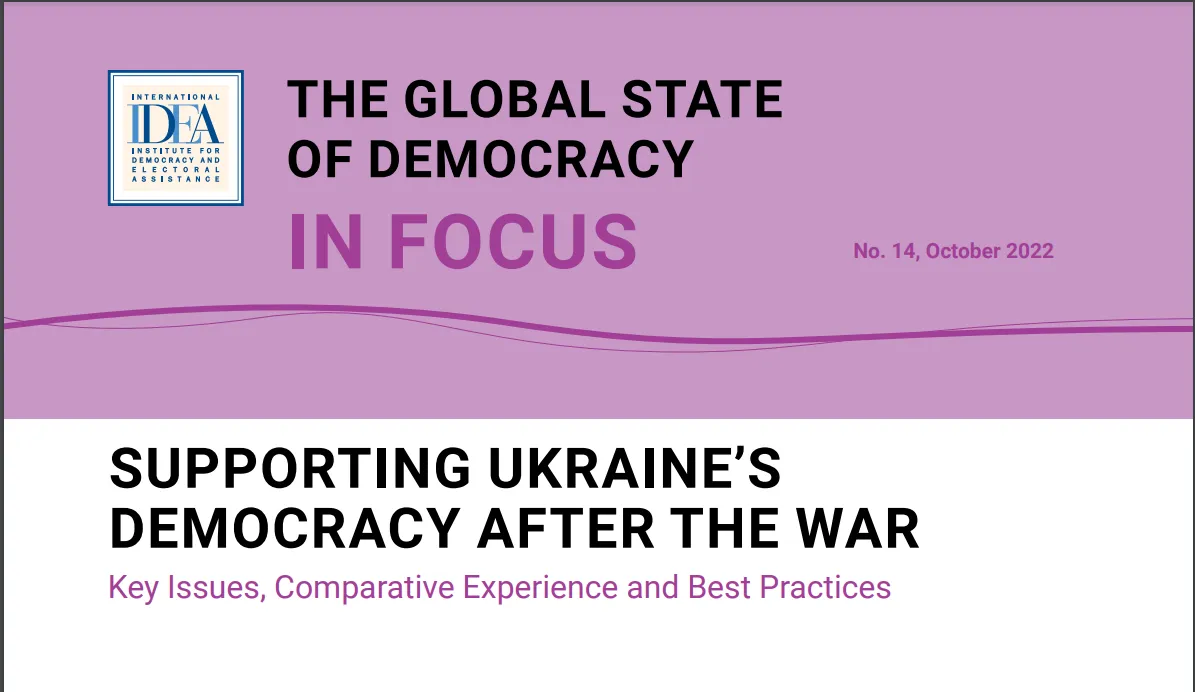Supporting Ukraine's social contract after the war

Disclaimer: Opinions expressed in this commentary are those of the author and do not necessarily represent the institutional position of International IDEA, its Board of Advisers or its Council of Member States.
Last month, International IDEA released a GSoD in Focus report, Supporting Ukraine’s Democracy After the War, which argues sustainable support for Ukraine requires centering and providing respectful support to Ukraine’s democratic institutions.
Although the report is focused on key aspects of Ukraine’s post-war reconstruction, the main thrust of its argument applies today, as highlighted recently by Western countries’ and international financial institutions struggle to agree on a plan to finance Ukraine’s public budget and cancel or restructure its public and private debt.
As we argued in a blog in May of this year, this delay requires Ukraine to balance the provision of public goods to its war-ravaged public and maintaining good relations by making payments and reaching permanent settlements with public and private bondholders. While Ukraine’s Ministry of Finance has reportedly worked wonders in this regard , the wariness of Ukraine’s private creditors to press too hard on debt payments may not be as durable as policymakers would hope.
That support for Ukrainian democracy requires providing its government the fiscal space to be responsive and answerable to its citizenry should not be an overly controversial statement. However, delaying debt restructuring or forgiveness essentially cedes the authority to decide Ukraine’s economic future from the sphere of democratic politics to that of private financial institutions. The issue then becomes not finding a solution, but whether the solution determined by bond markets, investment houses, and white-shoe law firms will cohere with the broadly articulated political goal of a democratic reconstruction on Ukrainian terms.
This sentiment is also less radical than it may seem at first glance—Finnish Prime Minister Sanna Marin, French President Emmanuel Macron, and the Financial Times have recently questioned which aspects of economic decision-making should be the responsibility of the democratic sphere and which are best left to some combination of courts, regulators and market forces. In all three cases the above were discussing the domestic balance between elected governments and their central banks. But the core issue—where democracy ends and where the law begins—is not at all distant from the question facing Ukraine and its international partners. The core concern is a critical examination of the balance between global financial markets regulation—the rules of which are, to be clear, determined by New York state regulators and London-based interpreters of English Common Law - and the articulated policy goals of democratic nations.
In other words, is the division between law and politics as determined in the current social contract fit for the dealing with the current crisis? Are there alternatives that might alleviate the current impasse, and also head off or lessen the severity of coming crises? Legal scholar Katharina Pistor has argued that “a legal order that has de-politicized the social sphere by fortifying private rights without regard to the effects of the exercise of these rights might have on others is prone to crises.”
As western leaders struggle to provide Ukraine an exit from its financial straits, it is worth asking whether the problem is unavoidably economic, or a product of the current legal order governing finance and contracts. The answers may not always be immediately at hand, but the road to finding them lies through critical, democratic debate and contestation.
The GSoD in Focus report Supporting Ukraine’s Democracy After the War, is available online here.




